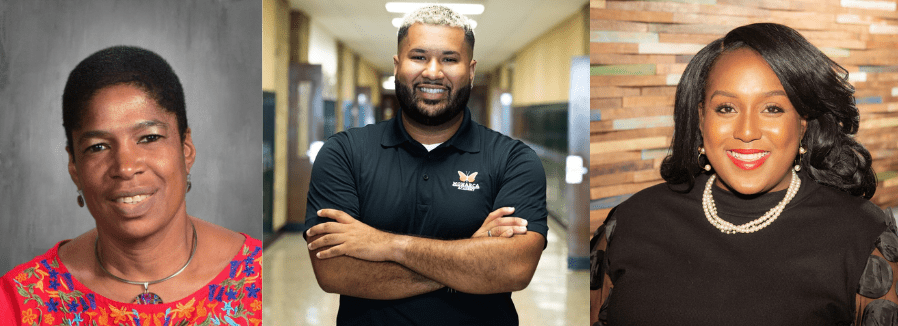
Eight-year-old Samira Ruiz sits in her third-grade class at Global Prep Academy.
She sits between an African American girl and a Hispanic boy; her features stick out as a mixture between the two. A deep shade of smooth dark skin, her long kinky curls surround her face.
“They [my classmates] always tell me about my skin color. They say I’m Coco-Cola or I’m a color that’s above Coca-Cola,” said Samira Ruiz.
RELATED: National Hispanic Heritage Month and Pan-African relatedness
Down the hall, her seven-year-old sister Odalma Ruiz sits in another classroom. Odalma Ruiz’s tanned caramel skin offers a striking difference in skin color, and her light brown curls are looser around her face.
“She’s the same to me!” Samira Ruiz stresses, “Well, at least we dress the same. We have almost the same hues.”
They both feel more similar than different from each other, and when asked how they identify, they say they are from Honduras.
Samira Ruiz said there is a distinction between how Americans see her race versus what she experienced in Honduras.
“Many people there are kind and don’t say anything about skin colors.”
Hues of Heritage: Afro-Latino?
Hispanic Heritage Month celebrates the history, cultural pride and influence of past generations that came to the United States from Spain, Mexico, the Caribbean, and Central and South America.
Along with that pride comes a mixture of colors, from the lightest on the spectrum to the darkest.
Afro-Latino is a new term coined to explain the identities of those within Latino culture who have clear roots to African countries because of slavery.
Liset Gonzalez-Acosta, dual language director for Global Prep Academy, was born and raised in Cuba and said the terminology of Afro-Latino is more widely used in the U.S.
In Cuba, they do not make that distinction, according to Gonzalez-Acosta.
“To all Cuban citizens, you’re Cuban. It doesn’t matter what color or what race you are. Everybody has the same rights, but there was a lot of colonization,” said Gonzalez-Acosta.
“Enslaved people came from Africa, and there were indigenous people in Cuba who were completely exterminated by the Spanish conquistador. So, everybody’s a little bit of everything. I was confused when I got here to the United States; people were asking, ‘Are you Afro-Cuban?’ I was not.”
Angela Brito de Rodriguez, who was born in the Dominican Republic, moved to the United States when she was five years old and has served as an educator for the last few years.
“There are a lot of folks that still don’t understand what that means to be Afro-Latino. The pushback comes from just a curiosity on why the need for the distinction,” said Rodriguez.
Hues of Heritage: Hispanic heritage
“There are people that I’ve encountered in my life that are Dominican like me, that are chocolate like me, that aren’t as open and as willing to embrace their Afro heritage. They’re not excited about having Afro kinky hair. They’re not excited about having dark skin.”
Jose Castillo Jimenez, business operations manager for Monarca Academy, is half Dominican and Venezuelan.
He grew up in Venezuela before moving to the U.S. when he was six years old, and said Afro-Latino is not a term he would have used in middle and high school.
“You grow up hearing these comments about Black individuals and Africans, and you want to stay away from it. That’s what you’re taught, but as you grow up, you learn who you are,” said Jimenez.
“To me, it’s a part of me that I was told to be ashamed of, or that I should hide, or that I shouldn’t scream and celebrate. So, now it’s me saying, ‘Hey! I’m Afro Latino; I’m celebrating every single part of who I am and my identity.’”
Hues of Heritage: African pride
Rodriguez said the reasoning behind considering those of different racial backgrounds and ethnic groups American can be applied to Latinos, emphasizing that Latino is not a race or nationality, but a culture made up of many.
“I just wish people were more open and aware of the diversity within this bucket of being Latino. I also wish that they understood that people weren’t identified or self-identified as Latino until they came to the United States,” said Rodriguez.
Although the term Afro-Latino may be new, the concept of celebrating and highlighting the Blackness within oneself does not take away from Latino pride.
“I think anybody who tries to deny the Black that we have is crazy because it’s ingrained in our DNA; it’s in our music, reggae and the food that we eat; the spices that we use; it’s a part of our communities,” said Jimenez.
When push comes to shove and people want to place labels on her identity, eight-year-old Ruiz is not phased.
She said at the end of the day she feels confident in who she is.
When asked how she would approach others who would want to deny her identity, she said her response would be:
“I don’t care, bro. I’m just me,” laughed Ruiz.
Contact staff writer Jade Jackson at (317) 762-7853 or by email JadeJ@IndyRecorder.com. Follow her on Twitter @IAMJADEJACKSON










